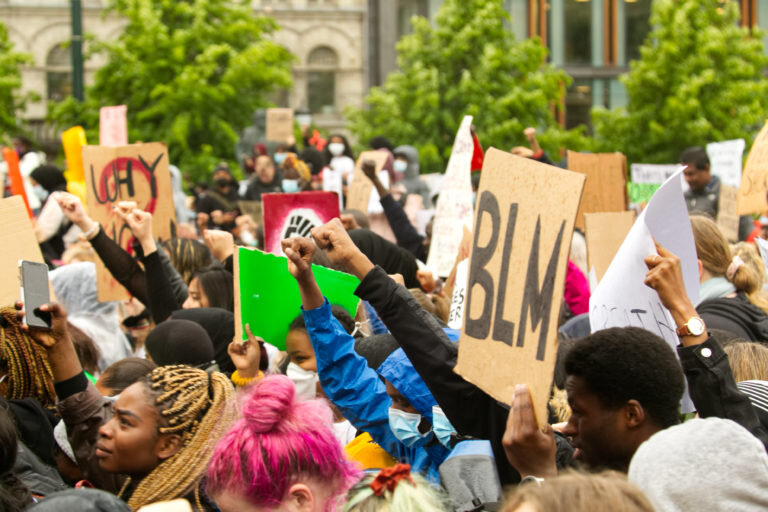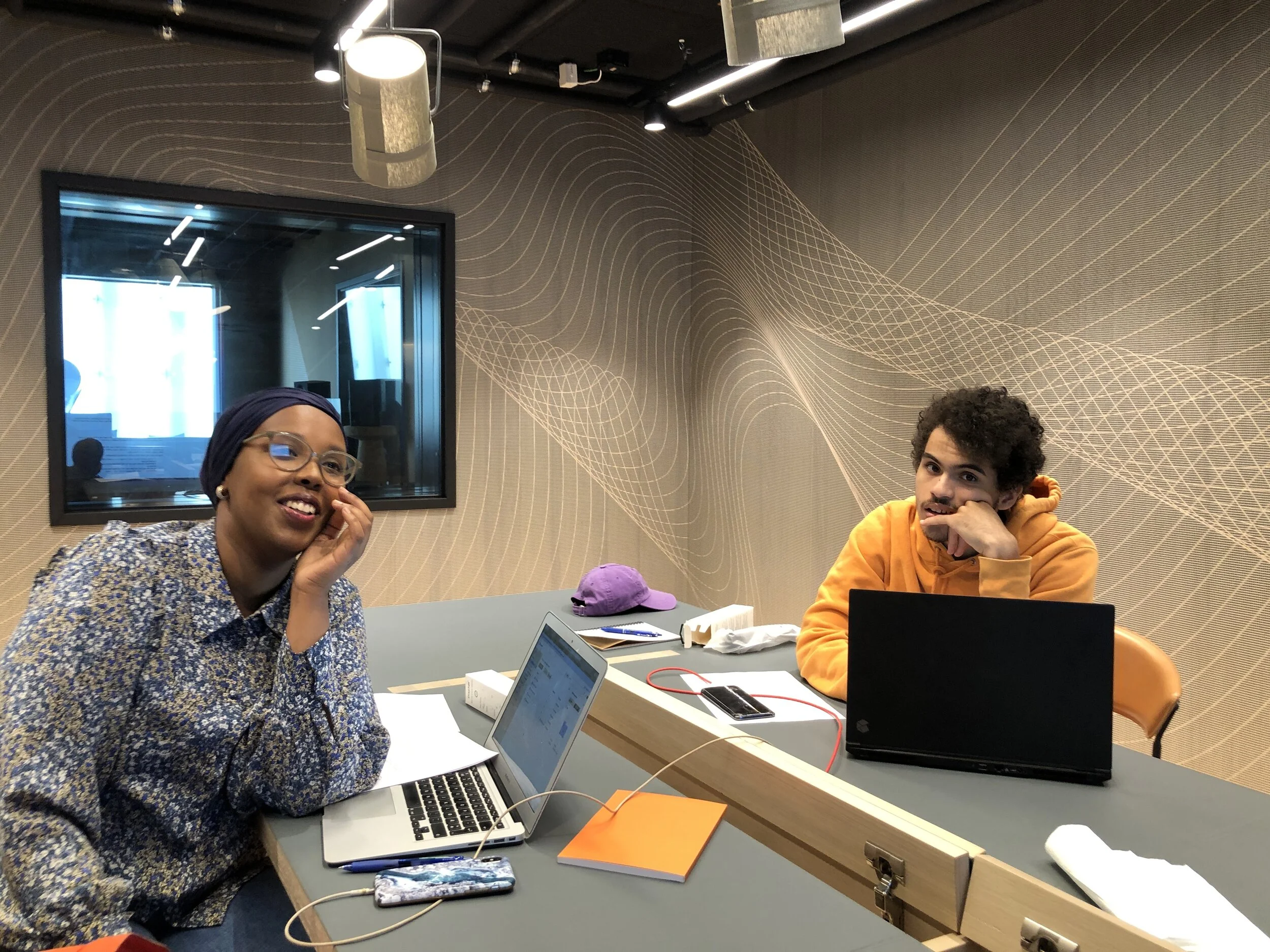MUNTLIG HISTORIE
"We can’t breathe.
Rettferdighet for George Floyd"
5. juni 2020 i Oslo
LEV og Memoars Muntlig Historie-Team (fra venstre)
Miles Flikke, Michelle A. Tisdel (LEV), Sahra Hirsi,
Cathrine Hasselberg (Memoar) og Ifrah Hassan Osman.
Project 3
innsamlingen av Muntlig historie & utstillingsprosjektet «Din pust, din stemme»
Din pust, din stemme vil bygge videre på utstillingen «LIFT EVERY VOICE. Plakater og bilder fra antirasismedemonstrasjonene i Norge 5. Juni 2020», som var på Kunsthall Trondheim 26. november 2020-23. januar 2021. LEV vil bidra til utstillingen med protestplakater og korte tekster. Mediehuset The Oslo Desk vil bidra med fotografier og videodokumentasjon fra demonstrasjonen i Oslo juni 2020.
English
COLLECTING ORAL HISTORY & THE EXHIBITION PROJECT «YOUR BREATH, YOUR VOICE»
Your breath, your voice will build on the earlier exhibition «LIFT EVERY VOICE. Posters and pictures from the anti-racism demonstrations in Norway 5 June 2020 », at Kunsthall Trondheim 26 November 2020-23. January 2021. LEV will contribute to the exhibition with protest posters and short texts. The media house The Oslo Desk will contribute photographs and video documentation from the demonstration in Oslo in June 2020.
Fra «spontane» plakater til muntlige historier
Muntlig historieintervju tar utgangspunkt i Memoars metode og satsing “Muntlig historie for alle”.
Prosjektet har også som formål å samle inn muntlige historier om antirasisme og protest demonstrasjonen i Oslo. De innsamlede fortellingene kan også bevares av Norsk Folkeminnesamling som samfunnsdokumentasjon av antirasisme og i Norge.
English
FROM «SPONTANEOUS» POSTERS TO ORAL STORIES
Oral history interview is based on Memoar's method and initiative "Oral history for all". The project also aims to collect oral stories about anti-racism and the protest demonstration in Oslo. The collected stories can also be preserved by the Norsk Folkeminne Samling as social documentation of anti-racism in Norway.
Hvorfor muntlig historie?
Enkeltpersoners egne berettelser gir informasjon om hva som skjedde, og individenes egne perspektiver på hendelsene. De utfyller fortellingene fra media og andre, og gir unike innblikk i variasjonen og bredden av handlinger og perspektiver, men gjør det også mulig å se mønster på tvers. Muntlige historier om antirasisme og demonstrasjoner utgjør et viktig bidrag til å sikre en helhetlig samfunnsdokumentasjon av samtiden.
Muntlig historie som dokumentasjonsmetode er anerkjent i nordisk og internasjonal sammenheng, og er særlig aktuell der det finnes få materielle spor, eller der menneskers egne liv er i fokus. Gjennom Memoar sitt prosjekt ‘Muntlig historie for alle’, blir materialet videre arkivert hos Norsk Folkemuseum. Opptakene blir dokumentert gjennom logging/autotranskripsjon, sammendragstekster og emnestikkord.
English
Why oral history?
Individuals 'own stories provide information about what happened, and the individuals' own perspectives on the events. These stories provide unique insights into the variety of demonstrators and the scope of their actions and perspectives. Oral stories about anti-racism and demonstrations make an important contribution to ensuring comprehensive social documentation about our times.
Oral history as a method of documentation is recognized in Nordic and international contexts. It is particularly relevant where there are few material traces, or where people's daily lives are in focus. Through Memoar's project “Oral history for all,” the material will be archived at the Norwegian Folk Museum. The recordings are documented through logging / auto-transcription, summary texts, and keywords.
Demonstranter i Oslo, 5. juni 2020. Foto: Ka Man Mak, The Oslo Desk.
Forteller eier sin fortelling — Din pust, din stemme!
Fortelleren eier sin egen fortelling, og kan til enhver tid trekke hele eller deler av bidraget sitt. Dette innebærer også at fortelleren bestemmer om fortellingen kan tilgjengeliggjøres fritt. Les mer om muntlig historie og Memoars arbeid på nettsiden.
Les LEV og Memoars samtykkeerklæring Avtale om arkivering og bruk av lyd og/eller videoopptak.
Kontakt: Prosjektleder Michelle A. Tisdel, email: lev@lev-no.org
English
YOU OWN YOUR STORY — YOUR BREATH, YOUR VOICE!
The narrators own their stories, and can at any time withdraw all or part of the contribution. This also means that the narrator decides whether the story can be made publicly available. Read more about oral history and Memoar's work on the website.
Read LEV and Memoar’s consent form about the archiving and use of audio and or video recording.
Contact: Michelle A. Tisdel, lev@lev-no.org
Prosjektmedarbeidere Ifrah Osman (v.) og Miles Flikke på Memoars kurs i muntlig historie. Foto: LEV, 2021.
Sahra og Miles på kurs i Oslo august 2021. Foto: LEV.
Memoars Cathrine Hasselberg holder kurs i muntlig historie for prosjektmedarbeidere. Foto: LEV, 2021.
LEV og Memoars Muntlig Historie-Team: (fra venstre) Cathrine, Michelle, Sahra, Ifrah og Miles. Foto: Sahra Hirsi. 2021.






